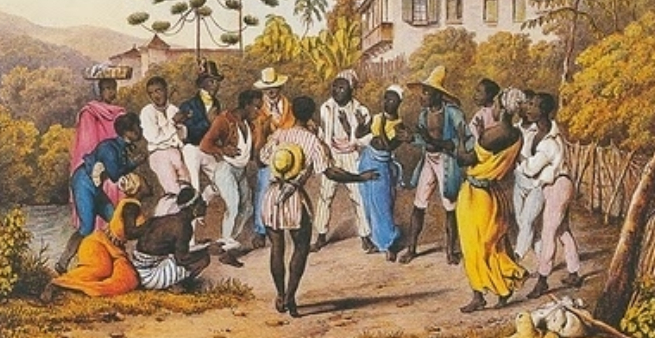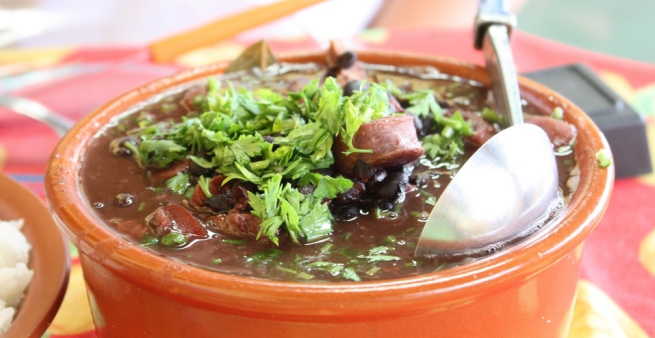Afro-Brazilian culture is the set of predominant cultural manifestations in Brazil, formed from the bringing together elements of the culture of African peoples who were brought into the country as slaves during the colonial period.
Afro-Brazilian culture is characterized and built by the incorporation of cultural expressions of the Africans with other traditions and cultures that make up the Brazilian identity, such as the indigenous and the European.
History of Afro-Brazilian Culture
During Colonial Brazil, all kinds of cultural manifestations of African origin were discouraged and marginalized in society. At that time, the customs and traditions of African peoples were considered primitive and savage by Europeans.
With the end of slavery in Brazil (1888), a slow process of reinterpretation of African culture began. In the mid-twentieth century, the Brazilian elite began to see some African cultural aspects as legitimate artistic expressions that represent national identity.
Approximately 40% of all blacks who were captured from their land in Africa were sold into slavery in Brazil. Due to this massive migration, the presence of
African culture helped form the basis of current Brazilian customs and traditions.Afro-Brazilian culture is present in almost all the forms that make up the national cultural identity, such as dance, music, cuisine, religion, folklore, etc.
Characteristics of Afro-Brazilian culture
- Heterogeneous, that is, in certain regions of the country there is a greater predominance of some of its particularities. For example, Afro-Brazilian cuisine is more present in the Northeast than in the South of Brazil;
- Constituted from the cultural heritages of different African peoples. Thus, there was an inevitable cultural appropriation between the customs of peoples from various parts of Africa. However, there are two main groups: Bantos (from Congo, Angola and Mozambique) and Sudanese (from West Africa, Sudan and Guinea);
- According to the Law of Directives and Bases of Education (No. 10.639/2003), Brazilian schools must include in the school curriculum the teaching of Afro-Brazilian culture and its history;
- The Brazilian states with the greatest expression of Afro-Brazilian culture are: Alagoas, Pernambuco, Maranhão, Bahia, Espírito Santo, Minas Gerais, Rio de Janeiro, São Paulo and Rio Grande do Sul. The explanation for this lies in the fact that these were the places that received the most intense slave migration during the colonial period.
Read about the Meaning of African culture and culture.
Music and Dance in Afro-Brazilian Culture
These are two aspects that have had a great influence on African culture. With the drum as the basis for the rhythms, many musical and dance genres were consolidated in the country, such as Maracatu, Cavalhada, Congada, Capoeira, Samba, among others.
Capoeira

Capoeira is currently considered an Intangible Cultural Heritage of Humanity, but this was not always the case. Capoeira was banned in Brazil for many years, seen as an activity of marginals.
Only in the 1930s did the practice begin to be allowed in the country, through a law sanctioned by President Getúlio Vargas.
Originally, capoeira was intended to serve as self defense of runaway slaves. By adding melodies while performing the movements, they pretended it was a dance and could practice inside the slave quarters without raising suspicions.
Samba

Among all the musical genres that were inherited from African culture, samba is the most expressive. It is an important part of the identity of the Brazilian people.
O samba emerged among slaves in the slave quarters, where men sang and played percussion instruments (drums, for example), while women danced to the beat.
Afro-Brazilian cuisine
African culture is also strongly represented in typical national dishes, such as vatapá, feijoada, acarajé, cocada, pamonha, sarapatel, etc.
Afro-Brazilian cuisine uses ingredients brought by African peoples and adapts some traditional Portuguese and indigenous recipes, creating its own rich cuisine.

Portuguese feijoada was adapted by the slaves, adding less noble parts of the pork meat (for example), boiled cabbage and toasted manioc flour (farofa).

Vatapd.

Fool.
Religion in Afro-Brazilian Culture
Victim of a lot of prejudice for decades, religions and cults from Africa have always been marginalized in Brazilian society. However, from the mid-twentieth century onwards, the intense persecution they suffered began to diminish.
O Candomblé and the Umbanda they are the best known religious manifestations of African origin, the last being created from the syncretism between Catholicism, Spiritism and Candomblé.
In fact, the religious syncretism it is very present in Afro-Brazilian religions. It is worth remembering that slaves were forced to convert to Catholicism when they arrived in Brazil and were prohibited from practicing their beliefs. Thus, Afro-descendants began to create associations of Catholic saints with their orixás so that they could secretly put into practice their religious traditions.
Learn more about the meaning of religious syncretism and know All about Umbanda.

Example of a typical Candomblé ritual.
Other Afro-Brazilian religions:
- babassue
- Batuque
- cabula
- egungun worship
- cult of ifa
- enchantment
- Omoloko
- shaman
- Quimbanda
- mine drum
- terecô
- Xamba
- Shango from the northeast.
Learn more about Umbanda it's the Candomblé.
Parties in Afro-Brazilian culture
Many popular festivities in the country are also influenced by African culture, such as Carnival, the Festa de Iemanjá (February 2nd), the Bumba-meu boi, the Folia de Reis and the Festa de São Benedito.
Learn more about Carnival.

